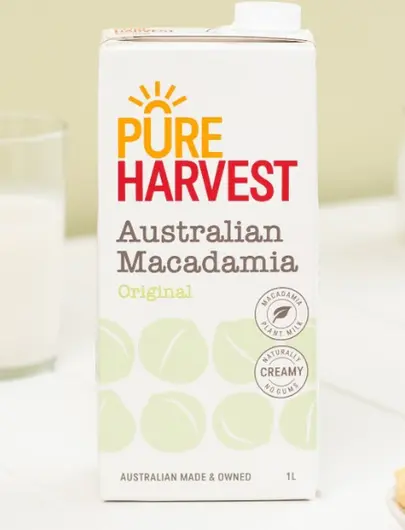Popularity of plant-based milks has skyrocketed in recent years. Gone are the days where we would order a coffee at a cafe and have it assumed that it would be with cow’s milk. Now we get asked which type of milk we’d like and there’s generally numerous plant-based options to choose from. So, whether you have an allergy or intolerance, are incorporating plant-based milk for ethical reasons or are just curious about mixing it up, this is your go-to guide for choosing the healthiest option for you.
What is plant-based milk?
Plant-based milks challenge the true definition of milk, which according to the dictionary is a noun that means ‘an opaque white fluid rich in fat and protein, secreted by female mammals for the nourishment of their young’. Rather than coming from an animal, plant-based milks are made from one or more plant ingredients and are designed to be a milk alternative. Depending on the type of plant-based milk, it may be similar in texture or colour to milk from an animal source. However, the nutritional profile varies milk to milk and there are no plant-based milks that have the same fat and protein content as milk from an animal source.
How to choose a healthy plant-based milk:
Choosing a healthy plant-based milk isn’t too dissimilar to choosing any healthy product, it starts by looking at the ingredient list. The main thing that we want to see on the ingredient list is that it is made up of real foods and doesn’t contain a long list of additives and/or preservatives.
There are two key ingredients in a plant-based milk:
- The main plant ingredient (for example almonds, coconut, oats, hemp seeds, etc.)
- Water, which is preferably filtered.
Other ingredients that may be present in a plant-based milk include a secondary plant ingredient. For example there are blends of almond and coconut milk, or some milks use the addition of rice milk to add some natural sweetness.
Speaking of sweetness, some plant-based milks will have an added sweetener. This is most commonly brown rice syrup, but may be another sweetener like coconut flower nectar or another syrup.
It’s also not uncommon to see some sea salt added to plant-based milks. Sea salt helps to bring out the flavour, while acting as a natural preservative.
A general rule for choosing healthy plant milks is: the simpler the better. We don’t want to see a long ingredients list and we should be able to recognise each ingredient as a real food.
Ingredients to avoid in plant-based milk:
Because the texture of plant-based milks is quite different to milk from an animal, some brands add thickeners, emulsifiers, stabilisers and other additives to get the texture closer to what we’ve been used to in the past. While these ingredients may make it creamier and can in some cases stop the plant milk from separating, we ideally want to avoid them as they tend to be more heavily processed or synthetic.
Another ingredient to avoid is vegetable oils, which include canola oil, rapeseed oil, sunflower oil, safflower oil, soybean oil and more. Vegetable oils are very highly processed and can contribute to inflammation within the body, so it’s recommended that we limit our consumption.
Other things to consider when choosing a plant-based milk:
The percentage of the main ingredient that is used to make the milk is another important thing to consider. It may sound strange, but it makes a difference.
Using the example of almond milk, we can look at the ingredients list to see what percentage of almonds have been used. Some almond milks will use as little as 3-4% almonds, which makes it more watery, gives us less of the nutritional benefits of almonds and means that the product is almost 95% water. A good percentage to look for in almond milk would be around the 10% mark.
Types of plant-based milks:
While there are already numerous types of plant-based milks on the market, there are more and more appearing as time goes on and interest increases. Some of the current types include almond milk, coconut milk, rice milk, oat milk, pistachio milk, macadamia milk, soy milk, hemp milk and cashew milk. Let’s take a closer look at a few of these:
Almond Milk
One of the most popular plant-based milks, you’ll find almond milk in most shops and cafes. The light nutty taste makes it suitable for a variety of uses and while it has a more watery texture than cow’s milk it makes a suitable alternative for those wanting a plant-based option.
Almonds are a good source of vitamin E, which is important for our skin, vision and blood. This nutrient also an antioxidant that can help prevent free radical damage. Along with their vitamin E content, almonds naturally contain calcium, which is one of the minerals that cow’s milk is known for.
Our favourite almond milk:
Nutty Bruce Activated Almond Milk
Ingredients: Filtered Water (84.5%), Activated Organic Almonds (10%) (Almonds, Water), Organic Brown Rice Syrup, Sea Salt.
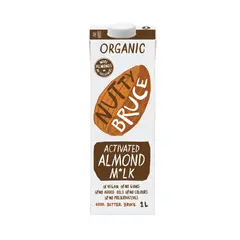
While many almond milks come in the liquid form, we can also purchase it as a paste that can be blended with water. This saves packaging and can be a good option if you don’t use a whole carton within a week. Here’s a great example that we’re loving:
Ulu Hye Mini Almond Mylk Base
Ingredients: Raw almonds** (min 96%), mesquite*, arrowroot*, macrobiotic sea salt. (*Australian Certified Organic, **Australian Grown & Insecticide free).

Introducing the game-changing Ulu Hye Almond Mylk Base - your secret weapon for whipping up creamy, delicious and nutritious almond milk right at home! Say goodbye to store-bought mylk loaded with preservatives and hello to this concentrated paste that's made with the finest, certified organic ingredients.
Almo Australian Almo Creme 250g
Ingredients: 100% Almonds
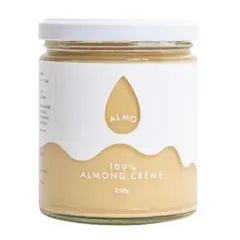
If you’re an iced coffee drinker, you’ll be pleased to know that you can now get iced coffee with almond milk too. Here’s one to try:
First Press Almond Milk Iced Coffee
Ingredients: Filtered Water, Cold Drip Coffee (25%) (Filtered Water, Coffee), Almonds, Coconut Sugar, Acidity Regulator (Dipotassium Phosphate), Stabilisers (Acacia Gum, Gellan Gum), Natural Flavour, Sunflower Lecithin.
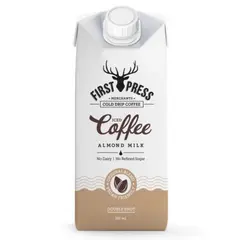
Coconut Milk
One of the creamier plant-based milks, coconut milk is a nut free option that is suitable for most dietary requirements. It has a natural sweetness and of course a delicious coconut flavour that naturally enhances the drink or dish that it’s added into.
Coconut milk in a can has long been used in curries and stews, however the coconut milk in a carton is more suitable as a general milk alternative.
You can find coconut milk on it’s own or in a blend, this almond and coconut option is a winner:
Nutty Bruce Almond & Coconut Milk
Ingredients: Filtered Water, Organic Rice, Organic Coconut, Activated Organic Almonds, Sea Salt
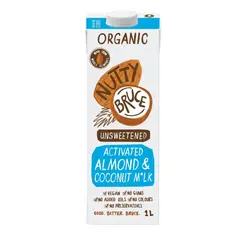
Along with being found in a liquid form, coconut milk can also be purchased as a powder. This is great for the shelf-life of the product and means you can make it up on demand. When making smoothies, this is a convenient option because you can add some of the coconut milk powder and then just use water as the base.
NuiLife Coconut Milk Powder
Ingredients: Organic Coconut Milk (97%), Organic Tapioca Maltodextrin, Organic Acacia Gum.
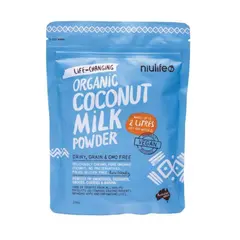
Oat Milk
Growing in popularity in the cafe space, oat milk is one of the creamier options and has a mild but pleasant taste, making it a great option to use in lattes. Oats are a good source of the soluble fibre called beta glucan, some of which carries over into the milk. Beta glucan is beneficial for both our gut and cardiovascular health.
You can enjoy the taste and benefits of oat milk by trying this option:
OMG! Oat Milk
Ingredients: Spring Water, Australian Oats (11%), Olive Oil (3%), Acacia Gum, Minerals (Calcium Carbonate, Dipotassium Phosphate), Sea Salt.
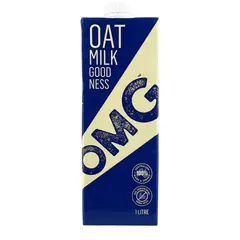
Macadamia Milk
Macadamias are known for their delicious taste and the milk is no exception. Macadamia milk has a slight vanilla taste and is a creamy option that can be used in almost any way you’d typically use milk. Macadamias, and as a result macadamia milk, are a source of manganese, vitamins B1 and B6, copper and magnesium.
Curious to give it a try? Here’s one we like:
Pure Harvest Macadamia Milk
Ingredients: Filtered Water, Roasted Macadamias (3%), Organic Brown Rice Syrup, Organic High Oelic Sunflower Oil, Plant Calcium, Sea Salt.
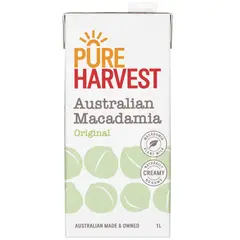
Pistachio Milk
With a green tinge, pistachio milk looks the most different to a typical milk. Pistachio milk has a nutty flavour and is naturally creamier than nut milks like almond milk. Pistachios are a great source of copper and vitamins B1 and B6, which means that we’re able to gain these nutrients through its milk.
Combining pistachio milk with the creaminess of cashews, this milk is a must try:
137 Degrees Pistachio Milk
Ingredients: Fresh pistachio milk 60% (from whole pistachios), Cashew blend 34%, Sunflower seeds 5%, Organic coconut flower nectar 1%
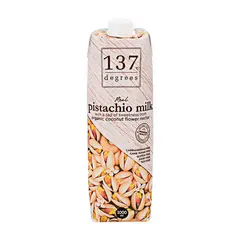
Hemp Milk
Hemp seeds are rising to fame thanks to their healthy fat content, which supports our heart, brain and skin, among other things. They also contain protein and fibre, all of which we’re able to get some of through the milk. Hemp milk has an earthy and slightly nutty flavour (despite not being a nut), it is relatively creamy and makes a great milk option.
Good Hemp Creamy Seed Milk
Ingredients: Water, Hemp Seed Base 4%, Emulsifier (Sunflower Lecithin), Stabiliser (Gellan Gum), Acidity Regulator (Dipotassium Phosphate), Sea Salt.
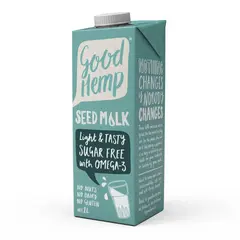
Soy Milk
One of the creamiest plant-based milks and also one with the highest protein content, soy milk is made from soybeans. It has a mild taste and is slightly sweeter than some of the other plant-based milks available. Thanks to its phytoestrogen content, soy milk may be beneficial in reducing menopausal symptoms. Soy milk is both gluten and nut free, making it a good option for those with intolerances, however not everyone is able to consume soy products which should be factored in on a case by case basis.
Rice Milk
Another nut free milk, rice milk has a more watery texture and a mild but sweet flavour. It is also commonly found in blends with other plant-based milks to enhance the sweetness. A common example of this is coconut milk having rice milk as a natural sweetener.
Macronutrients and plant-based milks:
As mentioned earlier, the macronutrient composition of plant-based milks are different to that of animal milk. The nutritional profile also varies between the different types of plant-based milk. For example, coconut milk is higher in fat and lower in protein than other plant-based options. While many plant-based milks will contain varying levels of protein and fats, they are generally quite low and we should turn to other foods to get these macronutrients into our diet.
Plant-based milks for different requirements:
If you have a dietary requirement, intolerance or preference, here is a guide of which plant-based milks would be good for you:
Nut Free Milks
For those with a nut allergy or taking foods into a nut-free environment, there are many plant-based milks that can be enjoyed. These include coconut milk, rice milk, soy milk, hemp milk and oat milk, to name a few.
Gluten Free Milks
Any of the plant-based milks except oat milk are suitable for those that are gluten intolerant. While oats are technically gluten free, they may be contaminated with gluten and/or contain a compound called avenin, which has a similar composition to gluten and may trigger symptoms in those with Celiacs disease.
Vegan Milks
All plant-based milks are suitable for vegans. There may be some very rare cases where a plant-based milk contains honey, in which case this one would not be vegan friendly. Aside from that hypothetical case, any type of plant-based milk can be enjoyed by those following a vegan diet.
Homemade plant-based milks
Along with purchasing ready-made plant milks, it’s also really easy to make them at home. As a general guideline, all you need to do is soak the nut/seed, drain it and then blend it up with water. Strain the milk through a nut milk bag or cheesecloth and the liquid that’s leftover is the final product. Here’s the bag you need to give it a go yourself:
Ever Eco Nut Milk Bag
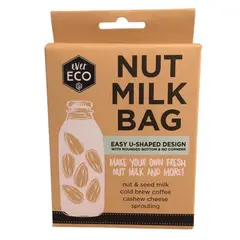
As we can see, there are numerous types of plant-based milks, as well as many uses and benefits of each. We’re loving working our way through them and experimenting with them all.
Shop Milk Products

